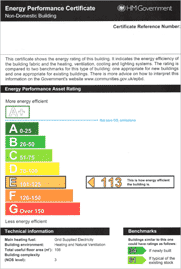 Call us on:
Call us on:
07860 289068
or
07977 070445
"Hi Andy.
Nice to meet you, wish the house was as efficient as you... very quick! It came out better than we thought so that's great. Thank you and will recommend your services"
Mr & Mrs C ....... from Hawkhurst
 Code of Conduct for Domestic Energy Assessors
Code of Conduct for Domestic Energy Assessors Commercial Energy Performance Certificates
As from 1st October 2008 all Commercial Buildings over 50m² (see exemptions below) require a Non-Domestic Energy Performance Certificate. The purpose of the Non-Domestic EPC is to assess a buildings’ CO2 emissions in line with the requirements of Building Regulations (Part L).
EPC Solutions (Kent) Partnership use industry standard SBEM modelling software devised by the Building Research Establishment (BRE) to create certificates for an extensive variety of buildings.
When is a Non-Domestic EPC required?
An EPC must be made available from the commencement point at which the process of marketing leasehold or freehold commercial premises for sale, or when commercial lease is assigned or granted .
Are there any penalties for not providing a Non-Domestic EPC?
The landlord is liable for failing to provide an EPC and could be fined for non-compliance, the fine for which can be up to £5,000. However, this is not clearly defined and the fine may be issued on multiple occasions if the EPC
remains outstanding.
Which Non-Domestic EPC do I need?
The Non-Domestic EPC is divided into 3 types depending on the nature and complexity of the building. Your assessor will need to be qualified to a suitable level to carry out an assessment:
- Level 5 Non-Domestic EPCs
Buildings over 50m² / Large buildings with atria will use DSM modelling software for the NonDEPC - Level 4 Non-Domestic EPCs
Buildings over 50m² with heating systems greater than 100 kW, cooling systems greater than 12 kW and ducted ventilation. - Level 3 Non-Domestic EPCs
All other buildings over 50m²
The Non-Domestic EPC suggests changes which can be made to improve efficiency. With energy costs growing all the time, businesses will benefit significantly by implementing these changes.
How long are EPCs valid for?
Non-Domestic Energy Performance Certificate will be valid for 10 years or until replaced with a newer one.
Are any Commercial Buildings Exempt ?
Yes - the following types of property are all exempt from the process and Do Not Require Certification:
- Lease renewals, lease restructuring (unless the floor is modified or the space refurbished) or surrendering.
- CPOs – Compulsory Purchase Orders
- Stand alone (ie 'detached') Buildings that are less than 50m² in size.
It follows that a small shop >50m² which is part of a terrace is not 'stand alone' and therefore it does require an EPC - Temporary structures or where evidence can be provided that the building is set for demolition within 2 years.
- Places of worship
- Certain buildings with low energy demand or where energy is not used in conditioning the internal climate in terms of heating, ventilation or cooling.
Is an EPC required for the whole building or for each unit?
Where a building containing separate units is sold or let as a whole, it is permissible to provide either:
- one EPC for the whole, including the communal area,
or - separate EPCs for all the units plus an EPC for the communal area.
Where only part of the building is on offer, it is only permissible to provide an EPC covering the whole building if the building has a common heating system to all parts. Where the units within the building are served by separate heating systems, an EPC should be available for each part being offered (plus an EPC for the communal area)
I’m selling a building for demolition – do I need an EPC?
If you can demonstrate the building is suitable for demolition and the resulting site is suitable for redevelopment and you believe on reasonable grounds that the prospective buyer or tenant intends to demolish the building, you do not
need to provide an EPC. Generally this can be demonstrated by having the relevant planning permission or evidence that planning permission has been applied for.
Shops with Accommodation above?
The decision depends on whether the residential accommodation is separate from the shop, that is, with its own access:
If yes, Non Domestic covers the shop and Domestic covers the dwelling.
If no, two further questions apply:
- is the proportion of the building occupied by the residential accommodation more than 50% of the total?
- might the commercial use (shop area) revert to domestic with the new occupier?
If yes to both, Domestic covers the whole property.
If no, Non Domestic covers the whole property.
Please contact us to discuss any further questions on Commercial Energy Performance Certificates you may have or how we can meet your Non-Domestic EPC needs.




